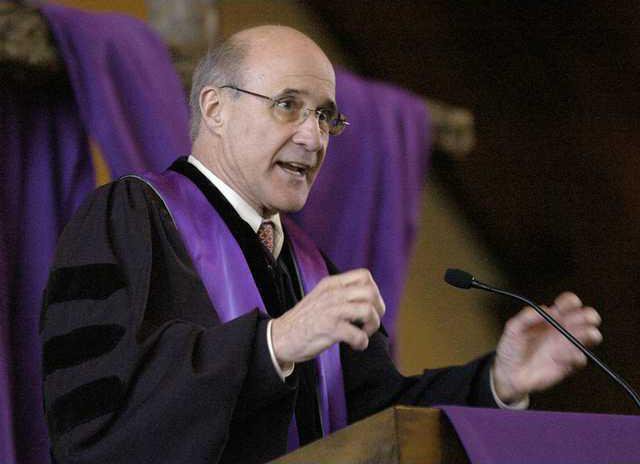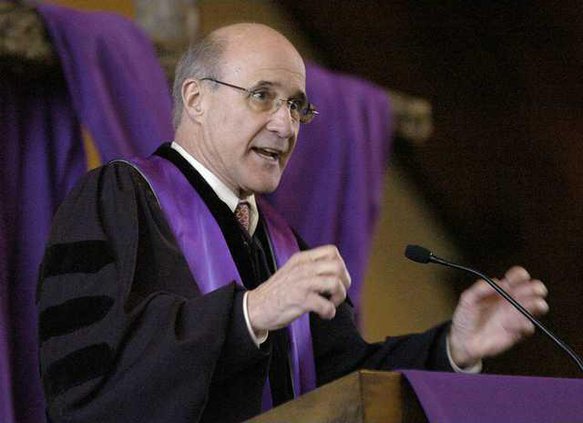AUD0301Sermons
The Rev. Dr. David McDonald talks about the development of a sermonGAINESVILLE — Each week, church members listen to their pastor’s sermon and the message it brings —but many don’t consider the amount of preparation that goes into it.
Pastors go to great lengths to prepare a sermon for each time they enter the pulpit.
"They told us in seminary that you need to spend one hour in preparation for every minute of sermon," said the Rev. Dr. David McDonald, senior pastor at First Presbyterian Church in Gainesville. "So for a 20-minute sermon you would spend 20 hours, technically speaking. We don’t see how that is true until we think about reading books and doing the indirect things that input into a sermon; that is probably not far off the mark."
McDonald added that preparation is necessary to sermon success.
"There is no lonelier a place to stand up than in the pulpit when you have nothing to say," he said.
But does the inspiration come straight from the heavens through a divine message, or does it come from a more worldly presence?
For McDonald, the Holy Spirit really leads him to a sermon topic each week, he said.
"It kind of depends on the Holy Spirit the whole time to inspire me to tell me what I am supposed to preach on," he said. "And I realize that is a really vulnerable process because sometimes you can misread that. You have to really be read up on the Bible and live in it all the time so that the Holy Spirit has the chance to speak to you."
The Rev. Randall Popham said sermon planning at Lanier Hills is a total team effort, involving the pastor, three associate pastors and six church members.
"The team works better together," Popham said. "We come together as a team rather than me sitting alone in my office trying to come up with what everybody needs to hear.
"So the four (the paid church staff) of us will get away and think about where our people are ... what is happening in the lives of people at our church because whether it’s 10 years ago, 30 years ago, basically people are the same, dealing with the same issues."
This past week, the Lanier Hills pastors went on a sermon-planning and skiing trip to Lake Tahoe, Calif., to plan the sermons into next year.
"We really feel like what we do is systematic theology and then we take what all of Scripture says about that idea ... and then apply it to the people in language that is understood by them," Popham said.
As new series and weeks close in, Popham and his 10-member sermon planning team meet each Tuesday to fine tune the sermon.
"We have a teaching team, a pastoral team ... then we have a creative team," he said.
Lanier Hills will begin a new sermon series on Sunday called "Prison Break," inspired by the television show.
"People are in prison ... there are things in our lives that hold us in prison and they control us and we believe that Christ really came to truly set us free," said Popham, of the series that will run five weeks. "We are basically taking 12 steps for Christians and how to break free from those prisons we are in."
At First Baptist Church in Gainesville, the Rev. Dr. Bill Coates gets divine direction from the Lectionary.
"The Lectionary is an ancient system of Bible readings for every day of the year, Sundays included," Coates said. "What happened is the early church, in 300 or 400 A.D., the church wanted to follow the pattern from the prophetic announcement of Christ’s coming (Christmas) and then baptism which is Epiphany and then Lent, which is his suffering and crucifixion and then Easter, the resurrection and after that the life of the spirit at work in the church (Pentecost)."
The Lectionary, according to Coates, provides four different texts each week to choose from: two Old Testament readings, a gospel and an epistle reading.
"So every Sunday you have those texts to choose from," Coates said. "In fact, what it actually does for me is it causes me to actually preach on some themes that I probably would ignore because they probably wouldn’t be my favorites."
McDonald said he doesn’t follow the Lectionary, which some Presbyterian pastors do, but he does plan ahead of time.
"I usually work in series of sermons and when I get a couple or three weeks beforehand then I will start working more seriously on a particular sermon," he said. "For our Lent series we are focusing on the powerful statements that we can make."
When pastors attend seminary, they go through several courses devoted solely to sermon planning.
"In seminary, preachers go through two courses that relate to preaching," said Coates, who attended Southeastern Baptist Theological Seminary in Wake Forest, N.C. The components of a sermon were taught in a course called "Art of Sermon Preparation," but the "Art of Sermon Delivery" is the tougher course, according to Coates.
"We all have to write sermons and turn them in and get graded on the written sermon and then the scary part comes," he said. "They actually televise you preaching, then we preach to the class ... the whole thing is replayed for the whole class and they stop at certain points and criticize you all along the way."

